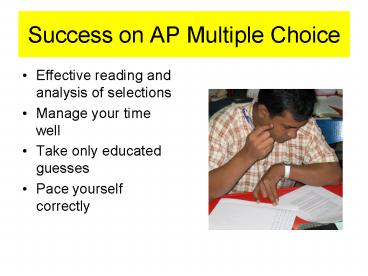Success on AP Multiple Choice - PowerPoint PPT Presentation
1 / 13
Title:
Success on AP Multiple Choice
Description:
Success on AP Multiple Choice Effective reading and analysis of selections Manage your time well Take only educated guesses Pace yourself correctly – PowerPoint PPT presentation
Number of Views:140
Avg rating:3.0/5.0
Title: Success on AP Multiple Choice
1
Success on AP Multiple Choice
- Effective reading and analysis of selections
- Manage your time well
- Take only educated guesses
- Pace yourself correctly
2
Set Priorities
- Quickly scan the passages do the easier ones
first and save the harder ones for last. You do
NOT have to do the passages in the order they
come. (Just be certain to record your answers in
the correct spot.) - Remember, you only have 1 hour. Give yourself
11-14 minutes for each passage and its questions
(depending on whether there are four or five
selections)
3
Question Types
- Main Idea
- Rhetoric - syntax, point of view, or figurative
language. - Mode you must understand narration, exposition,
description, and persuasion and be able to know
why and author uses a particular one
- Definition vocab. Questions use context clues
reread the sentence and substitute the
possibilities (You also need to read the
surrounding sentences!) - Tone or purpose (tone writers attitude toward
subject and audience purpose the effect the
author wants to have upon the audience)
4
Types of MC Questions (cont.)
- Tone or purpose (cont.)
- Tone is conveyed through diction
- You may also encounter a question about the
purpose of a footnote. Read the footnote
carefully and answer accordingly. (This is
another reason why you MUST learn the basics of
MLA/APA citation!)
5
Types of MC Questions (cont.)
- Form questions form is the method of
organization the writer uses. Some will use only
one form, some multiple forms. Look for
compare/contrast cause/effect/ order of
importance logical sequence of events spatial
order etc. - Misc. Questions on English grammar, punctuation,
mechanics, or terminology. - Misc. Questions on culture facts that are a
part of our civilization and that well-educated
people should know.
6
Attacking the MC Section
- Begin with what you think is the easiest passage
to read and understand - Skim the passage you have chosen. Then, re-read
the selection carefully. (Do NOT skip confusing
sentences!) - Look for the topic sentence or thesis statement.
Often it is near the beginning but you may find
it elsewhere or even simply implied and not
stated.
7
Attacking the MC (cont.)
- As you read, mark significant words or sentences.
(But dont spend a lot of time on this you only
have 11-14 min. total!) - As you read, observe organizational patterns.
- Mentally paraphrase the passage. (Practice during
this course by writing out paraphrases of
passages.) - Recall what you can about the author, literary
form, and historical period.
8
Attacking the MC (cont.)
- Main idea questions the correct choice must be
entirely true and contain the most relevant
information. - When asked to make judgments about what is
inferred or implied, find clues in the text to
support your answer. - Word meanings substitute the choices pay close
attention to context. - Tone or purpose pay close attention to diction
9
Attacking the MC (cont.)
- Reread lines, sentences, or paragraphs that are
identified in the questions!! - If you understand the passage, answer the
questions in order. - If the passage is giving you problems, answer the
easy questions and come back to the difficult
ones. (Do NOT spend an inordinate amount of time
on one question!)
10
Attacking the MC (cont.)
- Read the question stem carefully. Read ALL the
answer choices. Choice the most inclusive answer
or the generalization. - If one answer seems to contradict the other
answers you have given about the passage, rethink
that answer. - Narrow the choices and make an intelligent guess
- Beware of the not/except question because you may
forget what you are looking for.
11
Educated Guessing
- Ignore answers that are obviously wrong.
- Discard choices in which part of the answer is
incorrect. - Eliminate any response that has anything wrong
about it. - Trust yourself. Choose the answer you think is
right. DO NOT overthink the question!
12
Making Educated Guesses
Answer Choice Reason to Eliminate
Too narrow Too small a section of the selection covered
Too broad A wider area than the selection is covered
Irrelevant Nothing to do with passage relevant to passage but not to question
Illogical Not supported by facts in passage not supported by cited passage from selection
Incorrect Distortion of the facts contradiction of the facts
Not/except Answers that correctly represent the selection
13
Works Cited
- Moran, Margaret and Holder Frances. Petersons
Master AP English Language and Composition, 2nd
ed. PetersonNew Jersey, 2007. - abts.cornerstone.edu Picture of student































